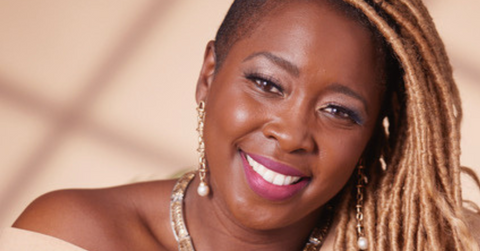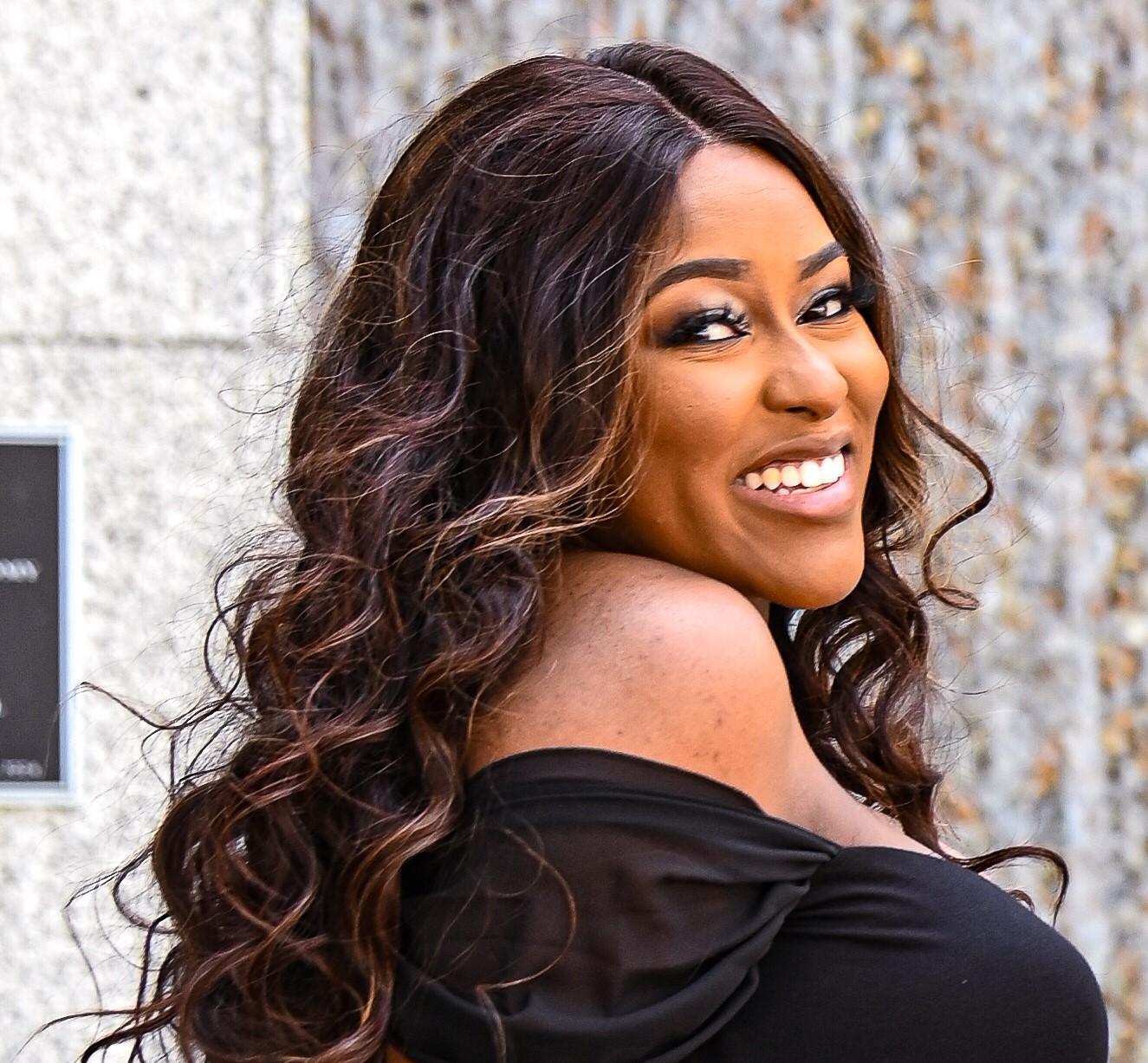“From love to loss to love again” is captioned on Regina Lawless’ Instagram page sharing her February engagement. What could easily be assumed by the caption is related to a personal relationship, but for Regina, author, entrepreneur, and former Head of Diversity, Equity, and Inclusion for Meta’s Family of Apps, it means so much more.
When her husband of 21 years suddenly passed away, the loss was the catalyst that led her to leave a 20+ year career in pursuit of healing.
Through her healing what she found was love. Not only through a partner but through releasing everything she knew to be true. Her journey led to writing the book, ‘Do You: A Journey of Success, Loss, and Learning to Live a More MeaningFULL Life‘ and creating Bossy & Blissful, a wellness community for Black women executives and entrepreneurs.
While the formal terminology centers around wellness with the goal in mind to help high-achieving Black women balance their hustle with healing — it’s easy to see that teaching women how to love themselves while working is foundational for Regina’s “second act” outside of corporate constraints.
With entrepreneurship as her focus, her determination to seek peace, redefine success, and thrive is guided by the sentimental mantra that titles her book, “do you.” Hear her story in her words by reading our inspirational conversation below.
Her Agenda: Thank you so much for joining me today. I know you have just a broad range of experience. Of course, the last thing you did in corporate was being Head of DEI at [Meta’s Family of Apps]. So I do want to get to that. First, I want to start at the beginning. I always think the why behind something is so important. So why HR for you? I’m a marketer. So to me, you came off as a marketer. So when I saw HR, I’m curious why?
Regina Lawless: It’s so funny. I actually thought in the beginning maybe marketing or PR, so let me tell you how I got into HR. It was actually by accident. I graduated with a degree in communication studies so you’re spot on with that. I originally wanted to be a journalist. I have a minor in PR, so I thought about that. But it just so happened that only a couple of companies were recruiting from my small town. Well, Sacramento is not a small town, but it feels like that. I went to Sacramento State University, and it still feels very much like a small community up there [where] an insurance company came to recruit folks and then Target.
I love Target so I ended up deciding to go with them right out of college in their management training program. They gave me some options, do you want to work in guest services as a manager? And I like people, but not that much, not enough to deal with customer returns and complaints. I thought maybe the clothing, they call it soft lines area. Then they said what about HR? That clicked for me because I am a people person. It seemed interesting to get to know the HR function.I got in and I loved it. I stayed in HR for almost 20 years.
Her Agenda: HR and DEI is not the same thing, although they’re in the same area. Why the pivot? What made you want to do that part?
Regina Lawless: I like to say that DEI is the culmination of all the experiences I’ve had in HR before that point, because at its core, DEI is about change management. It’s about strategy. You have to understand people and how the business works in those multiple parts of HR that you talked about. You have to know a little bit about recruiting talent, how talent is developed, how people are promoted, and how we assess performance so it was a gradual move for me over my career. I started as an HR generalist, and you get to touch on all the different functions of HR.
That was a great training ground for me. Then I decided to get my Master’s degree in Organization Development, which is a form of change management. That interested me in how we get leaders to do things that scale around people. That introduced me to the concept of diversity because I was working with leaders.
Around 2016, when I went into the tech industry, they were very interested in how we recruit more women. How do we recruit more people of color? I had a diversity champion reporting to me, and I was like, oh, I like this focus on trying to get more of us into this company. From there, I decided to specialize in leadership development.
I had a diversity component there because we were running programs for women’s leadership. Then a colleague of mine left there to be Head of DEI at Micron Technology, and she needed a strong number two, so that was my first full-time diversity role. I was a global director of DEI at Micron, and it felt like I had arrived. I was like, okay, this is everything I love about HR. It tapped into my passion for social justice.
From a very young age, because of where I grew up, I was always aware of inequality. Something in me has always wanted to fight to make things fairer for other people.
Her Agenda: I feel like it wouldn’t be a good interview if I didn’t ask, how do you feel about where DEI is today? And just to give a little background on why I’m asking, we know that there has been a shift where it seemed more around the 2020 time period that people were going to put effort towards this initiative. And now it seems like people are kind of backtracking, especially in those very global and visible companies.
We also know there’s been this attack on DEI, even from the entrepreneurial side, as far as the Fearless Fund being sued and things with affirmative action. So I’m saying all that to say, do you still believe in the world that we exist in today that there’s still a role for DEI? If so, how does it look knowing that all these different challenges exist?
Regina Lawless: DEI has become like this hot potato issue. It’s interesting to see the pendulum swing in the other direction because you’re right, in 2020, that was like the heyday.
We had finally gotten to a point where people were listening, they were willing to do the work, or at least some of the work, and educate themselves. And then, of course, after a couple of years, people’s attention shifted, particularly as we got out of lockdown and other things were happening in the world. I say all that to say we have a problem in DEI of people not having the focus and attention that they had in 2020 and 2021.
We also have a very concerted, deliberate effort to try to demonize, undermine, and misinform around DEI. That poses a challenge for practitioners on how do you continue to move forward? I don’t know that I have a great answer to that other than we have to, because there is still so much work to be done. We can see the social movements right now that are happening and we’re going to regress if we don’t continue to move forward.
I think DEI practitioners have to get really creative in how [we’re] embedding what we know needs to be done, not in these necessarily flashy programs or initiatives, but [in everyday processes]. That’s [the] approach that we took at Meta—change the policies and practices around how we hire to make things more fair, and try to train managers to assess performance more equitably.
Some of the DEI fundamentals go back to a sports analogy: blocking and tackling. My son used to play football, so I was like the mom on the sidelines trying to learn football. I liken that to this, I feel like DEI was in the Superbowl in 2020 and we had all the resources and all the attention and now we almost have to go back to the fundamentals and that basic blocking and tackling — that work isn’t sexy. But I think that’s the work that needs to be done, around the systems and processes, which many companies were trying to do, but I think it got almost co-opted and people wanted to do these very loud, performative things and not really do the work of changing the system.
Her Agenda: I love the explanation of it all. And I think from the outside looking in, because again, I’m a marketer, that’s not my area, but we saw a lot of things and then it felt like it wasn’t very aligned with what we had all hoped for it to be. Now as more people have come out of these roles, it’s almost like the progress that we made was lost because so many people were hired, who are no longer with the company.
Regina Lawless: Yes, myself included. I was one of those hires. Instagram created that role in the wake of George Floyd’s murder. There were a lot of us that got into that head of DEI seat or into DEI teams in that era.
I think in some companies, the progress has slowed or come to a grinding halt, so that’s where we need to get creative. DEI is one of those things that it’s almost doomed to fail from the beginning because of the way it’s structured in a lot of companies. It’s one person or a handful of people who don’t have the resources and you’re trying to solve a problem that’s not yours to solve.
Her Agenda: That segues to a good point though about just where you are. I know you’re not in that role anymore, but the reason that you’re not in that role is not particularly because of anything Meta-related. You had something personal happen to you, which was your husband passing away. So first, my condolences. With that being said the way I envisioned this part for you is almost a part two which included writing a book called “Do You,” and that it was anchored around the last text message that you received from your husband. Why was it so important to embed those words into what you were doing in this next period?
Regina Lawless: I love that. People always ask me, where does the title come from? And I try to encourage them to A. read the book because if you get to the end, you’ll know exactly the full story. But you captured it.
It was something [from] my husband. The last text message from him said, ‘do you, babe, don’t worry about anything else.’ And I’ve come to live into that over the years. For so much of my life, and if you read the book, you’ll hear about this journey or you’ll read this journey of me constantly striving and chasing this success up the corporate ladder. That’s all that I knew. So many of us are taught the American dream is to get a good job, preferably a good corporate job, get the salary, then you can have all the things, the car, the house, the vacations, whatever the things are. But as you pointed out, I got there and I was like, is this it? And losing my husband just made that question even louder for me.
Is this it? Is this what I’m supposed to be doing with my life? Is this what I want for myself? Through my grief journey, I came to realize I had gotten so far away from who I was and ‘doing me’ what I believe in, what I enjoy that I had lost. I’d lost myself. In the grief journey, I ended up finding this text message from him probably a year or so after he passed, it was actually in the course of writing this book.
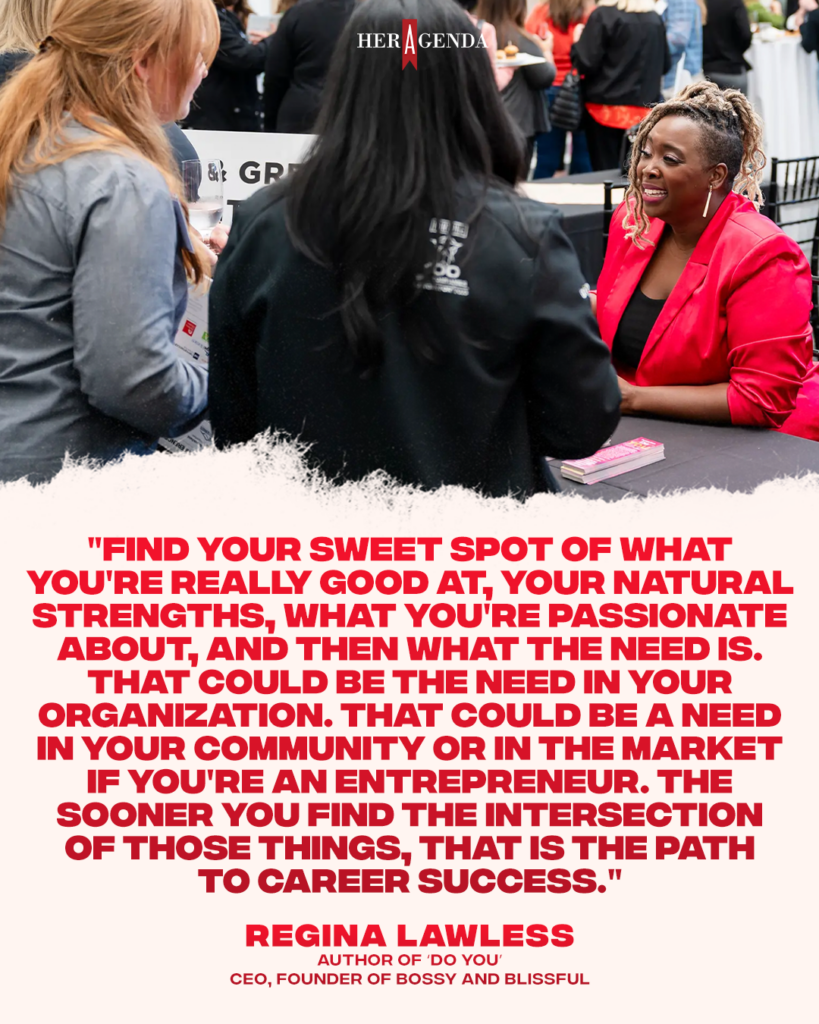
Her Agenda: Something I wrote down that you said in one of your previous interviews about this book is that it is the guide to being yourself. For millennial women or especially Black women. It feels very hard to show up and be yourself. In that interview, you said you were the queen of compartmentalization and that people would not know what was going on with you. But we know the impact that has on how we feel. All that to say, what is the advice that you would give someone today who’s still hoping to climb the career ladder? What advice would you have for them?
Regina Lawless: I would say be very careful, and be very intentional about the company you choose to work for if you choose to work in service to a corporation or an organization.
I was not intentional. Well, I take that back. I was intentional in taking roles that could grow my skills and could increase my salary. I was working on building a legacy. I grew up poor. I wanted to make sure that I had success that would help support me and my family. But I didn’t pay attention to the companies and the sacrifices that I had to make to conform and all of the extreme work hours and assignments.
I would tell younger women, that you don’t have to put yourself through this extreme sacrifice, especially if what you really want to do is to be a truer version of yourself. If that is what you desire. I believe that’s what all of us should work towards.
Try to find those environments that align with who you are. By the time I got to Instagram, that was a company that had much more freedom of expression. I had gotten to a point in my career where I just felt more comfortable in my skin and had gotten to a point where I had all the receipts, and all the credentials so who going to tell me I can’t show up with my head shaved on the side?
But at the beginning of my career, I very much was trying to conform and fit into a very white male dominant culture in all of those companies. That would be my advice to be intentional and not try to put yourself in those extreme situations where you have to be a completely different version of yourself.
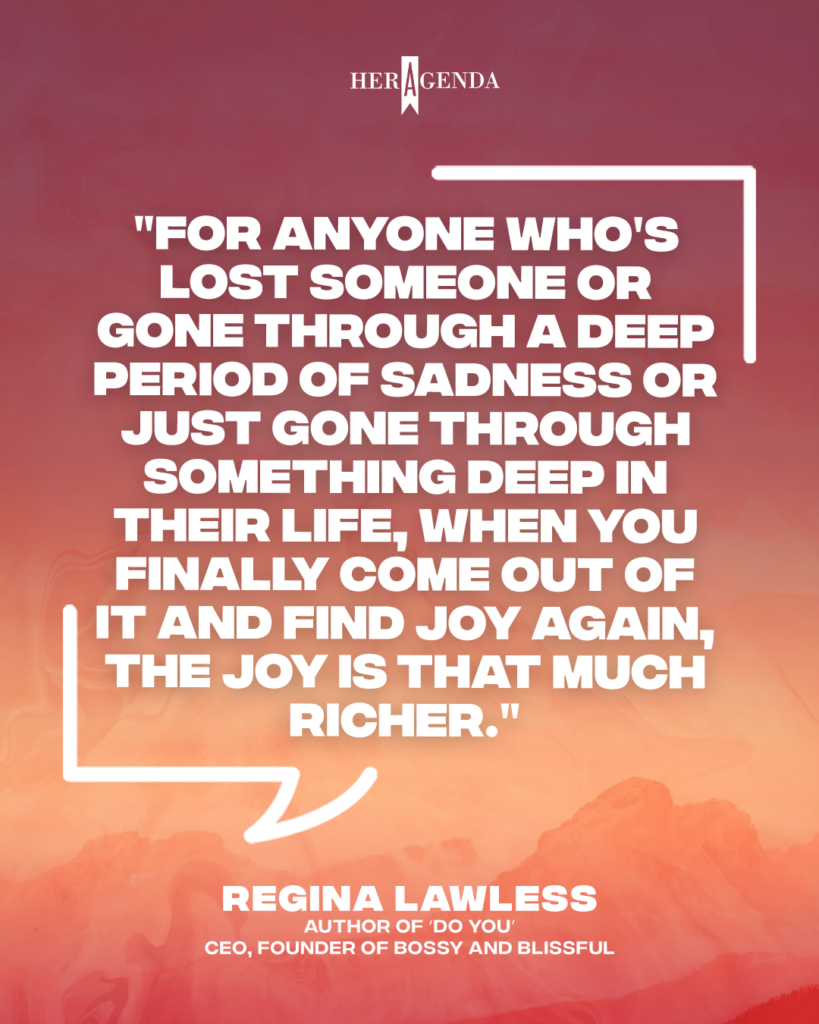
Her Agenda: Now that you’ve ventured into entrepreneurship, which is a 180 [degree-turn] from being in corporate, entrepreneurship comes with a whole other set of challenges. How does your previous work role play into the work that you do today as far as being an entrepreneur?
Regina Lawless: There are a lot of crossovers and a lot of skills I learned in my corporate life that helped me today. One of those is knowing how to set a strategy and set goals. As a corporate leader, I had to either come up with a strategy or if we were given a strategy from leadership, figure out how to translate that into goals for me and my team to accomplish every quarter.
I still use that approach to figure out, ok, what do I need to do and how am I going to get there? How am I going to get from A to Z? It also has taught me how to budget, and how to think about resources and revenue because I owned budgets as a corporate leader. That gives me a sense as an entrepreneur, even though I don’t have the same budget that I had. I wish I had the budget that I had in corporate. I wish I had all the people too. Sometimes I’m like, oh, like, where’s my admin assistant? Where are my peeps to help me out here? Because I’m doing it by myself right now. One thing that I’m doing now that I did a lot in corporate was training and workshops.
And then coaching. I use my experience working in corporate and being a corporate leader to help other women who are still in corporate. I see myself because I’ve walked that path, I can be a good coach and guide to others who are still struggling to find themselves and find meaning and purpose.
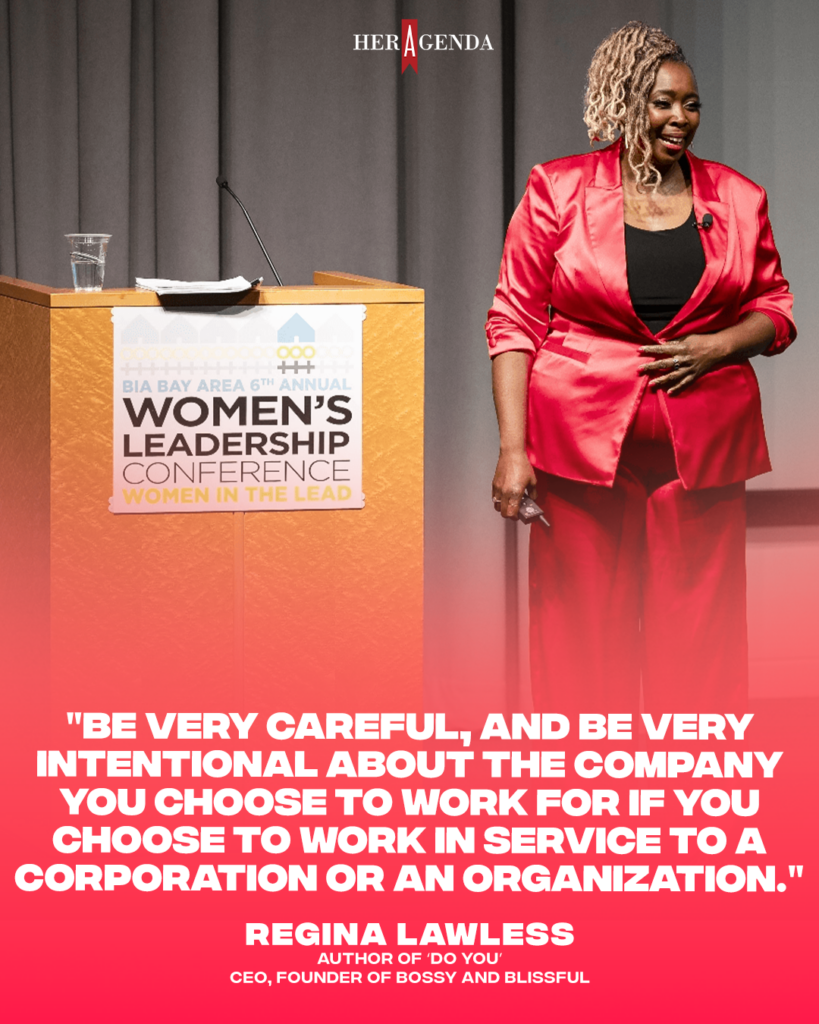
Her Agenda: With that, you named this business Bossy and Blissful. Why Blissful? Bossy, I got it right away because you’re a boss. You’re a DEI boss. You’re the boss of your life right now. I get it. Why blissful?
Regina Lawless: Oh, I love that. For two reasons, I learned to be blissful again after my grief. For anyone who’s lost someone or gone through a deep period of sadness or just gone through something deep in their life, when you finally come out of it and find joy again, the joy is that much richer. For me, I am living my bliss.
For folks who know me, like my former team at Meta one of my team members said, that’s so you like you are bossy and blissful. In many ways, the brand is an extension of my personality. There’s a toughness and a bossiness to me.
I’m very driven, and very goal-oriented. I don’t play about my business, but there’s also a lightness and a joy and I don’t take myself too seriously. I think that balance is necessary.
We spend too much time thinking about all this stuff in corporate. I like to say now those people will let you go tomorrow if they have to, so do not give all of your life force. If they decide tomorrow, they have to cut everybody. You are on that list. I say treat it with intention, go there and do what you’re supposed to do but also live a really big blissful life in the meantime.
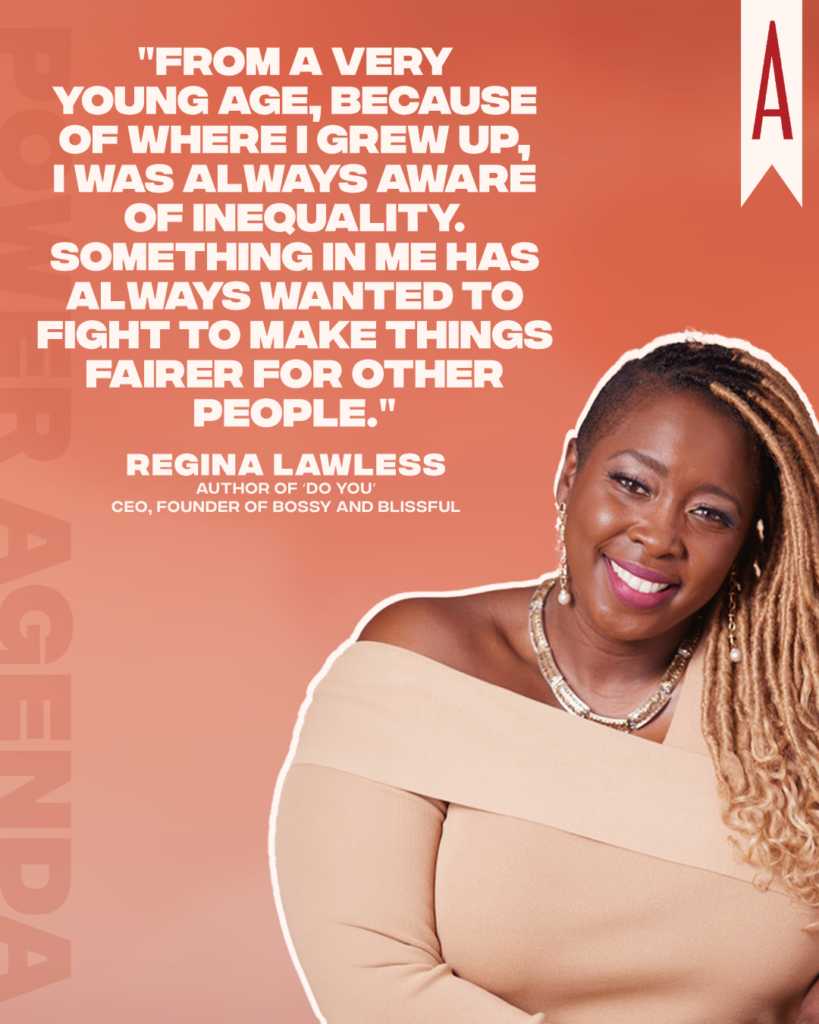
Her Agenda: If you had to offer one piece of advice to someone as far as being a career coach, what would you say to them that way that you feel will put them on the correct path?
Regina Lawless: I would say find your sweet spot of what you’re really good at, your natural strengths, what you’re passionate about, and then what the need is. That could be the need in your organization. That could be a need in your community or in the market if you’re an entrepreneur. The sooner you find the intersection of those things, that is the path to career success.
I found I spent too much time trying to work on the things that I wasn’t naturally good at or trying to emulate male leaders and contort myself to be a certain way. I’m never going to be the person that comes in a meeting and tells everybody what to do. That’s not how I operate.
I am a relationship builder. I influence through relationships and collaboration. I like to leverage the talents of everybody to get the best outcome. I had to find that that was my strength. That’s what I would say. Find, figure out, and there are so many different assessments that you can figure out your natural strengths, but do that.
Do what you’re strong at, what you love. Do that wholeheartedly. And sometimes it may feel like that’s not where the money is. But as someone who got the bag and then some, I will say that money isn’t all that there is. I left a very cushy, very nice executive job at Meta. I left a lot of money on the table, but I am happier than I’ve ever been.
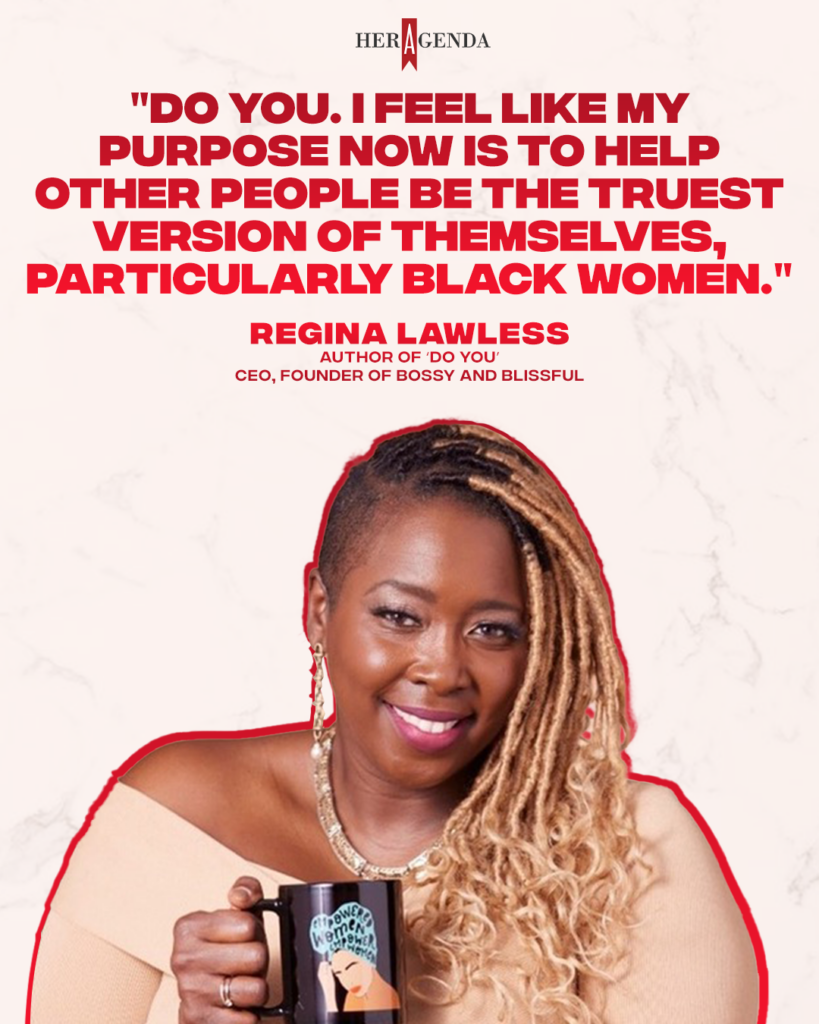
Her Agenda: What is your motto? So do you have one?
Regina Lawless: Ooh, well, it’s gonna sound cliche, but ‘do you.’ And that’s why I feel like my purpose now is to help other people be the truest version of themselves, particularly Black women.
[Editor’s note: This interview has been edited for length and clarity.]

